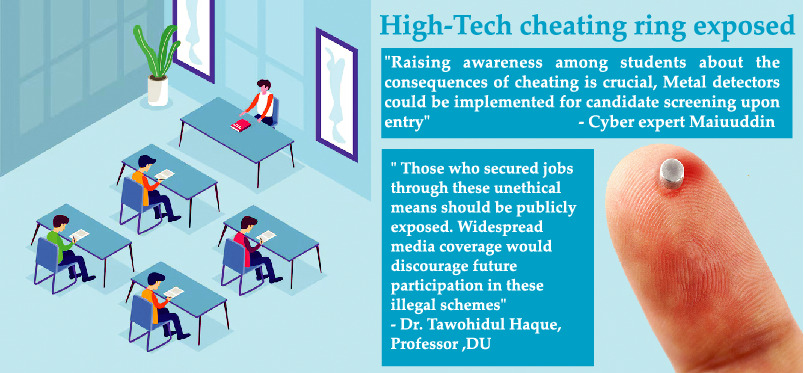Syed Shemul Parvez :
Question paper leaks in recruitment exams continue to plague Bangladesh, despite stringent measures by the authorities.
Law enforcement agencies are struggling to contain the problem as sophisticated cheating gangs employ advanced technology to evade detection.
These gangs reportedly utilise hidden digital devices to transmit leaked questions and answers. Examinees, acting on the gang’s instructions, conceal these devices in their undergarments. Miniature earbuds complete the illicit setup, allowing the gang to provide real-time answers during exams.
A recent raid by the Dhaka Metropolitan Police’s Detective Branch (DB) exposed one such operation. Seven individuals were apprehended on charges of leaking question papers for various recruitment exams and supplying answers through high-tech devices.
According to Mohammad Harun Or Rashid, Additional Commissioner (DB Chief) of DMP, the apprehended gang possessed the ability to solve entire question papers within a mere ten minutes using their advanced technology. Examinees would conceal these devices in their innerwear, with miniature earbuds placed discreetly in their ears to receive answers from the gang.
Rashid disclosed that this elaborate cheating scheme has defrauded a significant amount of money. Depending on the job position, the gang charged between Tk 3-5 lakh for MCQ written exams and a staggering Tk 8–10 lakh for combined written and viva exams.
The issue of question paper leaks was further addressed by Dr. Tawohidul Haque, Associate Professor at the Institute of Social Welfare and Research at the University of Dhaka and a criminologist.
Dr. Haque told The New Nation about the recent apprehension of an organised gang that employed “fanciful techniques” using advanced digital devices to leak exam questions and exploit examinees for lakhs of taka.
He emphasised the evolving nature of these cheating rings, stating, “Their constant adoption of new and sophisticated methods makes detection extremely challenging.”
Dr. Haque delved deeper, questioning the root causes of this phenomenon. He acknowledged the allure of government jobs and opportunities at public universities, often perceived as offering greater security and a higher income. This, he suggested, might be a contributing factor to why some students resort to such illegal means.
Dr. Haque further proposed stronger deterrence measures. “Those who secured jobs through these unethical means—both the individuals and the organisations that hired them—should be publicly exposed,” he asserted. “Such widespread media coverage would discourage future participation in these illegal schemes.”
He concluded by advocating for stricter examination hall protocols. “While technology advances, so do miniaturised devices employed by cheaters. Metal detectors at exam centres may be necessary to deter these attempts,” he suggested.
Arif Maiuuddin, a cybersecurity expert at Decodes Lab Ltd., echoed these concerns. He acknowledged the challenge posed by ever-shrinking digital devices: “Technology facilitates the creation of these tiny devices, making them difficult to detect.”
However, Mr. Maiuuddin offered a roadmap for mitigating these issues, as he proposed an outright prohibition on any electronic devices within exam halls. When necessary, metal detectors could be implemented for candidate screening upon entry. Raising awareness among students about the consequences of cheating is crucial, and a move away from multiple-choice questions (MCQs) towards more creative, application-based, and practical examinations could further deter cheating.
The recent release of 87 Dhaka University students who faced accusations of question paper leaks in 2017 due to insufficient evidence highlights the need for a more robust legal framework.




